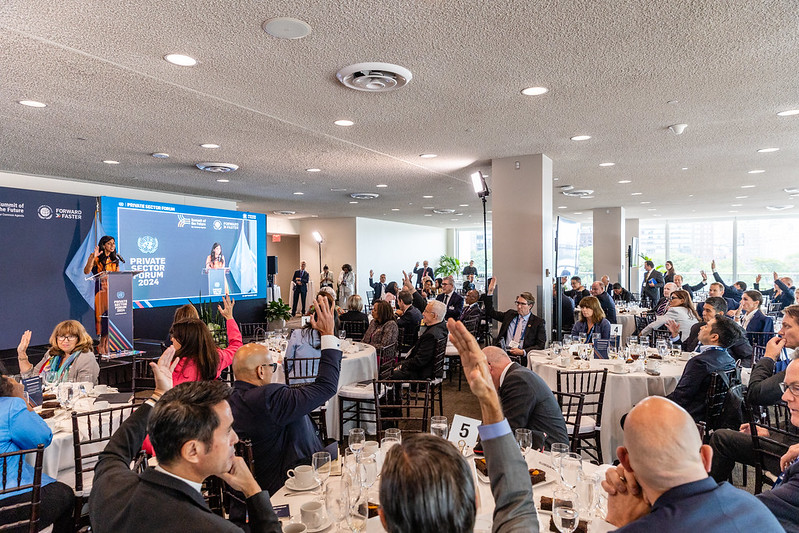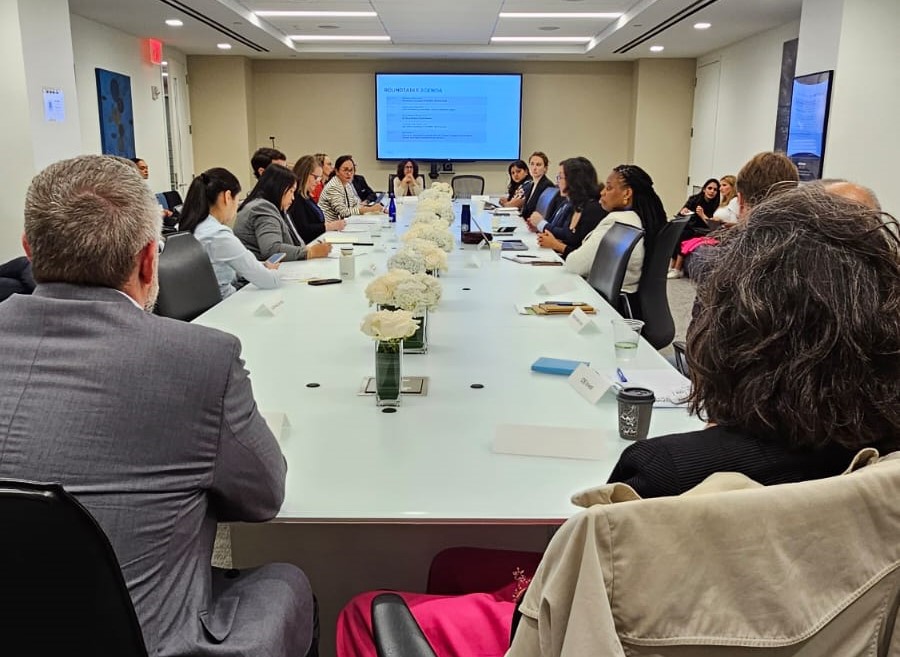Watch it here: LINK

In commemoration of the International Women’s Day, the Indonesian Ministry of Women’s Empowerment and Child Protection, joined heads of international organizations, members of the business sector, and the Indonesia Stock Exchange to Ring the Bell for Gender Equality. Ring the Bell for Gender Equality is a bell ringing ceremony that aims to raise awareness of the key role private sectors play in accelerating progress for gender equality. This year’s Ring the Bell for Gender Equality invites business sector partners to highlight women’s leadership and full participation as the best way forward to recover better and stronger post COVID-19.
The COVID-19 pandemic is deepening the pre-existing inequalities and causing a setback to gender equality and women’s empowerment. Women have lost jobs at a higher rate than men during the crisis. Women’s employment in Indonesia has risen to 6.5 percent up from 5.2 percent pre-pandemic, which was a 5-year low; and women-owned and women-led micro, small and medium enterprises have been severely affected. Women are also doing more unpaid care and work. The current projection shows that the economic gender gap will not be closed for another 268 years.
To increase awareness about the issue, Indonesia Global Compact Network (IGCN), Indonesia Business Coalition for Women Empowerment (IBCWE), together with International Finance Corporation (IFC) and Indonesia Stock Exchange, with the support from UN Women’s WeEmpower Asia programme funded by the European Union, held the ‘Ring The Bell for Gender Equality’. The event is part of global bell-ringing events held by 121 stock exchanges and all over the world.
Now in its third iteration in Indonesia, the Ring the Bell event titled ‘Gender Equality Today for Sustainable Tomorrow’, offered reflections on the theme of the day and called for a concerted action to promote women’s representation in economic recovery post COVID-19. This year’s Ring the Bell aligns well with Indonesia’s G20 presidency theme “Recover Together, Recover Stronger” which focuses on cooperation for post-pandemic recovery.
In her keynote speech, Minister of Women’s Empowerment and Child Protection, H.E. Bintang Puspayoga, underscored the importance of stronger collaboration between government and the business sector to accelerate progress for women’s empowerment. “Gender equality in the workplace requires commitment from companies, therefore we really appreciate companies in Indonesia that have signed the Women’s Empowerment Principles (WEPs). Gender inequality is a very complex issue, caused by patriarchal culture that has embedded itself for centuries. For this reason, strong synergy is needed between government, local governments, academia, the business sector, the media, and the wider community. We hope that the audience at this event can also support the acceleration to achieve gender equality. In the momentum of International Women’s Day, we break old beliefs that limit women’s movement through real action in all access to development.”
“Investing in women and enabling their full economic participation is necessary for businesses and society to build strong economies. We cannot accelerate women’s economic empowerment unless we address the structural inequality and discrimination,” said Thibaut Portevin, Head of Cooperation, EU Delegation to Indonesia. “I am pleased to see growing support from companies as allies in promoting equal rights, including their efforts in advancing gender equality by signing to the Women’s Empowerment Principles (WEPs) and implementing these principles in their day-to-day business operations.”
Indonesia has a total of 157 WEPs signatories as of March 2022. Interest from the corporate sector to sign and carry out the WEPs, guidance to businesses on empowering women and advancing equality in the workplace, marketplace, and community, has grown significantly since the first Indonesia’s Ring the Bell for Gender Equality commemoration in 2019.
Jamshed M. Kazi, UN Women Representative and Liaison to ASEAN, emphasized women’s representation in economic recovery. “Women are the drivers of economic growth. While we focus on recovering from the pandemic, we have the opportunity to build back better and faster by learning from our past commitments and actions. We trust the business sectors here today will grasp this opportunity to push for a bold and sustainable change that enables women’s full and equal participation.”

The Ring the Bell event also invited participants to join in the Fireside Talk to discuss women’s economic challenges and contributions and how to seize the opportunity to put women at the center of sustainable recovery.

“When we talk about gender equality, it is not just a women’s issue. We also need to include men in the discussion and actions to achieve it. In a culture that is gender equal, the needs of both women and men are addressed. Thus, SDG #5 is achieved. As one of the leading organizations for gender equality in Indonesia, IBCWE are encouraging men to support gender equality through our 2022 campaign #LelakiTurutSerta.” shared Maya Juwita, Executive Director of the IBCWE on women’s empowerment, gender equality, and G20 agenda at the Fireside Talk session.
Josephine Satyono, Executive Director of IGCN encouraged more businesses in Indonesia to take a transformative step to establish equal opportunities for women and men. “Gender equality is intrinsically linked to all our development challenges from human rights, peace and security, to economic growth, education, and sustainability. The evidence is clear, when women are empowered, everybody benefits.”
“Having women at the table is not only the right thing to do, but also the smart thing to do. Women’s participation in leadership and on the climate agenda makes a significant difference,” said Azam Khan, IFC Country Manager for Indonesia and Timor-Leste. “As the engine for growth, job creation and innovation, the private sector is indispensable in advancing women’s economic empowerment and sustainable development.”
Risa E. Rustam, Director of Finance and Human Resources, Indonesia Stock Exchange, further invited companies and businesses in Indonesia to set a path to gender equality, “We encourage companies in the capital market industry to continue to improve good practices of gender equality and women’s empowerment in their businesses by taking concrete actions by implementing gender sensitive and gender responsive policies to move gender equality and women’s empowerment in a substantial way toward a more sustainable business and future.”

ABOUT
UN Women
UN Women is the United Nations organization dedicated to gender equality and the empowerment of women. A global champion for women and girls, the organization was established in 2010 to accelerate progress on women’s rights worldwide. UN Women’s efforts are based on the fundamental belief that every woman has the right to live a life free from violence, poverty, and discrimination, and that gender equality is a prerequisite to achieving global development. WeEmpowerAsia is a UN Women programme funded by and in partnership with the European Union that seeks to increase the number of women who lead and participate in business in China, India, Indonesia, Malaysia, the Philippines, Thailand and Viet Nam. For more information, visit http://weempowerasia.org.
IGCN
Indonesia Global Compact Network (IGCN) is a local chapter of the United Nations Global Compact, the largest corporate sustainability initiative. A call for companies to equate strategy and operations with the universal principles of human rights, labor, the environment, and anti-corruption, and take action that can advance the goals of society.
IBCWE
Indonesia Business Coalition for Women Empowerment (IBCWE) is a coalition of companies
committed to promoting women’s economic empowerment and gender equality. Our mission is to support businesses to optimize their role in improving women’s economic empowerment and gender equality. IBCWE was formed with the support of the Australian Government through the Investing in Women program.
IDX
Indonesia Stock Exchange (IDX) is a non-profit Self-Regulatory Organization (SRO) in the Indonesia Capital Market that provides stock exchange services, which include market information and data, regulations, trading infrastructure, and trading services. IDX operates under the supervision of Indonesia Financial Services Authority (Otoritas Jasa Keuangan). As the only Stock Exchange in Indonesia, IDX consistently promotes Indonesia Capital Market’s integrity and ensures that securities trading activities are exercised in an orderly, fair, and efficient manner. For more information, visit www.idx.co.id.
IFC
International Finance Corporation (IFC)—a member of the World Bank Group—is the largest global development institution focused on the private sector in emerging markets. We work in more than 100 countries, using our capital, expertise, and influence to create markets and opportunities in developing countries. In fiscal year 2021, IFC committed a record $31.5 billion to private companies and financial institutions in developing countries, leveraging the power of the private sector to end extreme poverty and boost shared prosperity as economies grapple with the impacts of the COVID-19 pandemic. For more information, visit www.ifc.org.
The European Union
The European Union is the economic and political union of 27 Member States. Together, the European Union has built a zone of stability, democracy and sustainable development while maintaining cultural diversity, tolerance and individual freedom. In 2012, the European Union was awarded the Nobel Peace Prize for advancing the goals of peace, reconciliation, democracy and human rights in Europe.
The European Union is the world’s largest trading bloc, and the world’s largest source and destination of foreign direct investment. Collectively, the European Union and its member countries are the largest donors of Official Development Assistance (ODA), providing more than half of ODA globally. The 27 Member States of the EU (in protocol order) are: Belgium, Bulgaria, Czech Republic, Denmark, Germany, Estonia, Ireland, Greece, Spain, France, Croatia, Italy, Cyprus, Latvia, Lithuania, Luxembourg, Hungary, Malta, Netherlands, Austria, Poland, Portugal, Romania, Slovenia, Slovakia, Finland and Sweden.





